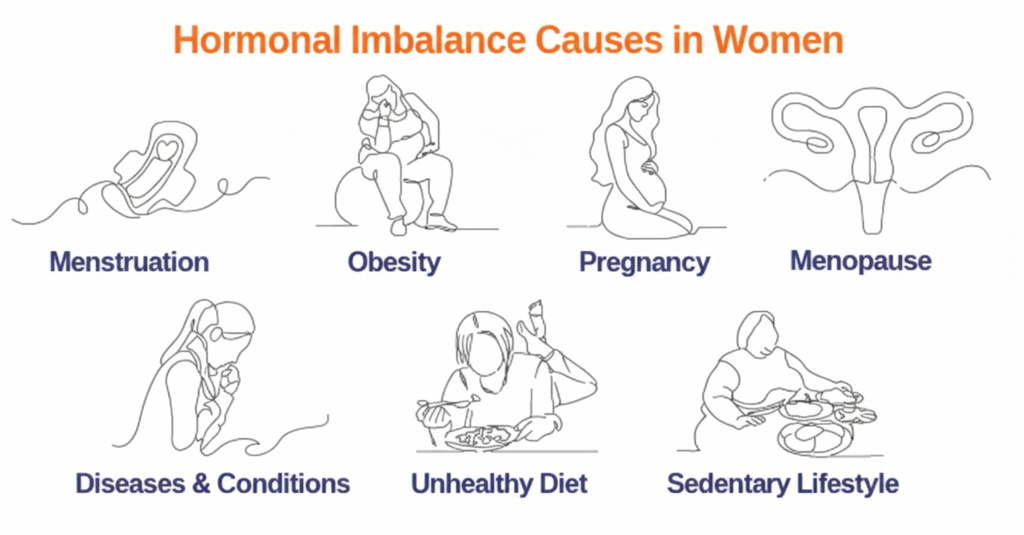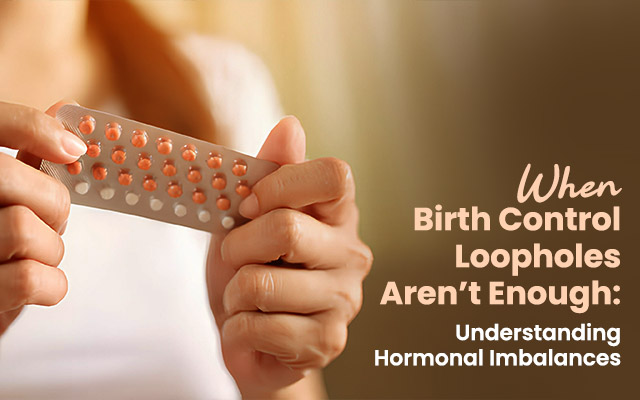A calendar marked with missed periods. A skin that suddenly breaks out. A mood that swings without reason. Even with birth control in place, the symptoms persist. The assumption is simple: if periods are regular, everything must be fine. But beneath the surface, something is off. Birth control might regulate cycles, but it doesn’t always restore true hormonal balance.
Dr Shivanjali Nayak, a female gynecologist in Kolkata, specialises in diagnosing and treating hormonal imbalances with a patient-first approach.
In this blog, discover why relying on contraceptives can hide deeper imbalances. Learn about the hormones behind periods, why symptoms return despite the pill, and how natural and medical solutions work together for long-term relief.
What Are Hormonal Imbalances?
Hormones are the body’s messengers. They control everything from periods to mood, sleep, skin, metabolism, and energy levels. A hormonal imbalance in women means one or more of these messengers are either too high or too low, causing symptoms that may go unnoticed.
Sometimes the signs are subtle. A person may have regular periods but still feel anxious, gain weight, or struggle with fatigue. These symptoms are often misread as lifestyle-related when in reality, they point to deeper disruptions in hormone levels. Recognising this early can prevent years of discomfort or misdiagnosis.
Key Hormones Affecting Women’s Health
- Estrogen and progesterone: Regulate periods, mood, and fertility
- Testosterone: Impacts libido and energy in small amounts
- Thyroid hormones: Control metabolism and menstrual cycles
- Insulin: Affects blood sugar, linked to PCOS and birth control issues
- Cortisol: A stress hormone that affects many body systems
Common Causes of Imbalance

- Menstruation- PCOS and menstrual cycle disruption
- Obesity- Weight gain
- Pregnancy- Birth control and hormones that override natural cycles
- Menopause- Hormone shift, Midlife change
- Diseases & Conditions- Hormone problem, Irregular periods, Weight gain
- Unhealthy Diet- Diet imbalances
- Sedentary lifestyle- Chronic stress and elevated cortisol, Poor sleep and lack of movement
Signs and Symptoms to Watch For
- Irregular periods cause that go unexplained
- Weight gain, hair loss, or facial hair
- Fatigue even after rest
- Acne or bloating
- Fertility concerns or short luteal phases
How Birth Control Interacts With Hormones
Mechanism of Hormonal Contraceptives
Hormonal contraception works by suppressing ovulation and tricking the body into thinking it’s pregnant. It controls symptoms like acne and heavy periods, but doesn’t cure hormonal imbalance.
Potential Side Effects on Menstrual Cycles
- Breakthrough bleeding
- Skipped periods
- Mood swings and anxiety
- Breast tenderness
These are part of the broader list of hormonal contraception side effects often ignored.
Limitations in Addressing Underlying Imbalances
Birth control may regulate cycles, but it doesn’t solve progesterone and estrogen imbalance, thyroid dysfunction, or insulin resistance. Once stopped, symptoms can come back stronger.
Dr Shivanjali Nayak, a female gynecologist in Kolkata, helps women manage hormonal health beyond the pill.
Common Hormonal Disorders Impacting Women
PCOS and Irregular Cycles
PCOS (Polycystic Ovary Syndrome) is a hormonal disorder that often leads to irregular cycles. In this condition, the body produces higher levels of insulin and male hormones (androgens), which affect ovulation.
As a result, periods may come late, skip entirely, or become unpredictable. These irregular cycles make it harder to conceive and may also lead to acne, weight gain, or excess facial hair.
Thyroid Dysfunction
- Hypothyroidism leads to weight gain, delayed periods, and fatigue
- It causes light, frequent periods and anxiety
Both conditions often go undetected until symptoms are severe.
Luteal Phase Deficiency

During the luteal phase, two hormones, estrogen and progesterone, play key roles. Estrogen helps thicken the endometrium, which is the lining of the uterus. After ovulation, progesterone takes over and prepares this lining to support a fertilised egg. It does this by responding to a hormone called hCG, which is released if fertilisation occurs.
Diagnosing Hormonal Imbalances
Blood Hormone Tests
Request blood hormone tests like:
- Day 3: FSH, LH, Estrogen
- Day 21: Progesterone
- Thyroid panel (TSH, T3, T4)
- Insulin, Testosterone, DHEA
Always interpret these with your symptoms over 2–3 cycles for accuracy.
Imaging and Ultrasound
Use imaging and ultrasound to detect ovarian cysts, fibroids, or thyroid nodules, especially in suspected PCOS or fertility issues.
When to Consult a Specialist
Consult a female gynecologist if you:
- Have persistent fatigue, irregular bleeding, or fertility issues
- Experience mood changes, acne, or bloating despite being on birth control
- Need clarity through hormonal testing and diagnosis
Treatment Approaches and Lifestyle Adjustments
Hormonal Therapy Options
- Thyroid medications for hypothyroidism
- Progesterone supplements for luteal phase issues
- Metformin for PCOS-related insulin resistance
- Short-term birth control for symptom relief
These therapies work better when lifestyle is also addressed.
Diet, Exercise, and Stress Management

Support your hormones daily through:
- Mindful Eating: Whole foods, healthy fats, and fibre reduce blood sugar spikes
- Regular Exercise: Walking, yoga, and strength training improve metabolism
- Positive Thinking: Stress management reduces cortisol levels
- Sleep Better: 7–8 hours of sleep improves hormone balance
Complementary and Natural Remedies
Remedy Benefit Ashwagandha Lowers cortisol, supports thyroid Vitex (Chasteberry) Improves progesterone and estrogen imbalance Omega-3 Reduces inflammation, balances hormones Maca root Supports libido, mood, and energy
Managing Hormone Levels Naturally
While medications and hormone therapies are valid solutions, daily lifestyle habits often hold the power to bring the body back into balance.
Steps to Naturally Support Hormonal Balance
- Mindful Eating
Choosing whole foods, healthy fats, and fibre-rich vegetables helps stabilise blood sugar and support hormone production. Avoid processed foods, excess caffeine, and refined carbs that spike insulin and disrupt estrogen.
- Regular Exercise
Gentle, consistent movement like walking, yoga, or strength training improves insulin sensitivity, supports thyroid function, and reduces cortisol levels.
- Sleep Better
Quality sleep is critical. Aim for 7–8 hours of uninterrupted sleep every night. A regular sleep schedule helps regulate melatonin, cortisol, and reproductive hormones.
- Positive Thinking
Chronic stress can elevate cortisol, throwing off the balance between estrogen and progesterone. Practising gratitude, meditation, or journaling can help shift mindset and support emotional and hormonal wellbeing.
Take control of your hormone health with expert care from Dr Shivanjali Nayak, a female gynecologist in Kolkata.
Monitoring Progress and Maintaining Balance
- Use period tracker apps and symptom journals
- Retest every 3–6 months as advised
- Don’t stop routines after feeling better
- Watch for recurring signs like bloating, fatigue, or mood dips
Why Understanding Hormones Is Crucial Beyond Birth Control
Hormonal symptoms may seem minor, but they often signal a deeper issue. Birth control can regulate cycles, but doesn’t fix the root imbalance. Understanding what’s really going on helps prevent long-term health issues. The body speaks through fatigue, mood shifts, and irregular bleeding.
Book an Appointment
When birth control no longer eases your symptoms, it’s time to look deeper. Persistent fatigue, acne, anxiety, or irregular bleeding can be signs that your hormones need more than regulation.
Dr Shivanjali Nayak, a female gynecologist in Kolkata, offers personalised care to uncover what’s going on and help you find lasting relief.
People Also Ask (FAQs)
1. Can a hormonal imbalance still happen while using birth control?
Yes. Hormonal birth control regulates your cycle by supplying synthetic hormones like estrogen and progesterone. It may cover up symptoms like acne or irregular bleeding, but it doesn’t fix the underlying problem.
2. What are the signs that birth control isn’t working for hormonal balance?
The signs that birth control isn’t working for hormonal balance
- Unexplained mood swings or anxiety
- Persistent acne or bloating
- Low libido or energy
- Irregular spotting or missed periods
- Weight gain without lifestyle changes
3. Can PCOS be cured with birth control?
No. PCOS (Polycystic Ovary Syndrome) is a metabolic and hormonal condition often linked to insulin resistance and inflammation. Birth control helps regulate periods and reduces androgen symptoms like acne or facial hair. But it doesn’t cure the root cause. Long-term management of PCOS involves:
- Mindful eating
- Regular exercise
- Hormonal testing and diagnosis
- Stress management
4. What lifestyle changes help restore hormone balance?
Several daily habits help in managing hormone levels:
- Eat hormone-supportive foods: Seeds, leafy greens, healthy fats
- Exercise: Gentle strength training or yoga
- Sleep better: 7–8 hours with a consistent bedtime
- Reduce stress: Journaling, therapy, or meditation
- Avoid plastics: Use glass or steel instead of BPA-laced containers
5. Can stress alone disrupt your hormones?
Yes. Chronic stress raises cortisol levels, which interfere with every major hormone pathway:
- Suppresses progesterone production
- Increases estrogen dominance
- Affects thyroid hormone conversion
- Leads to blood sugar issues and fatigue






